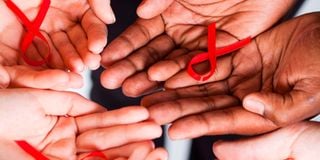UN Women, Pepfar promote young women's role in global HIV response

Young women between 15 to 24 are more vulnerable to HIV infection.
What you need to know:
- In 2021 alone, every two minutes an adolescent girl or young woman was newly infected with HIV – an estimated 4,900 new infections each week.
- Disproportionate vulnerability to HIV infection was linked to, among others, persistent gender inequalities, stigma, and discrimination, gender-based violence, child marriage, and unpaid care work responsibilities, barriers to education and employment opportunities.
African leaders converged in Tanzania to champion the role of young women in the global HIV response. The high-level meeting co-hosted by UN Women and the Government of Tanzania, affirmed that girls and women are disproportionately affected by HIV.
“Today launches an important new phase in women’s leadership in the effort against HIV/AIDS,” said Ms. Sima Bahous, Executive Director of UN Women. “It will ensure that the voices of women and girls of all ages who are disproportionately affected by HIV inform decision-making around the HIV response and that their needs are met.”
The meeting supported by US President’s Emergency Plan for AIDS Relief (PEPFAR) was held to mark the International Day of the Girl Child. During the meeting, it was revealed that in the 15 to 24 age group, girls are three times more likely to acquire HIV than boys in sub-Saharan Africa.
In 2021 alone, every two minutes an adolescent girl or young woman was newly infected with HIV – an estimated 4,900 new infections each week.
The meeting brought together emerging young women leaders, women ministers, and leaders in health, education, and gender equality from 15 countries where girls and young women experience disproportionately high rates of new HIV infections.
The disproportionate vulnerability was linked to, among others, persistent gender inequalities, stigma, and discrimination, gender-based violence, child marriage, and unpaid care work responsibilities, barriers to education and employment opportunities. Exacerbated by the COVID-19 pandemic, these factors were also hindering their access to HIV prevention and treatment services.
Speaking at the hybrid meeting, Tanzanian Minister of Health and Gender, Dorothy Gwajima urged leaders to mentor young women in order to build a future leadership which is strong. “We should open doors and invest in building their skills and confidence so they can make positive changes in their communities and countries,” she said.
The leaders also gave recommendations to address the alarming incidence of HIV. “To end the HIV/AIDS pandemic, we have to tackle inequities that leave adolescent girls and young women vulnerable,” said US Global AIDS Coordinator and Special Representative for Health Diplomacy Ambassador John Nkengasong, who oversees PEPFAR. Dr. Nkengasong added that PEPFAR, through its programmes like DREAMS would expand efforts to empower women and build partnerships at the community level which eliminate barriers that increase the risk of contracting HIV.
He also revealed that PEPFAR would expand its investment to close known gaps in HIV prevention by nearly 20 percent for the fiscal year 2023.
Participants at the high-level meeting used the hashtag #takethelead to raise awareness through social media. They reiterated the need for the active participation of young women in decision-making around the HIV response and beyond. They also highlighted the significance of joint efforts with established leaders to promote women’s rights.
Countries represented by the women leaders included: Botswana, Cameroon, Cote d’Ivoire, Eswatini, Kenya, Lesotho, Malawi, Mozambique, Namibia, Rwanda, South Africa, Tanzania, Uganda, Zambia, and Zimbabwe. Additional partners who supported the meeting in Tanzania included the African Women’s Leaders Network, the United Nations Tanzania, and the Joint United Nations Programme on HIV/AIDS (UNAIDS).





